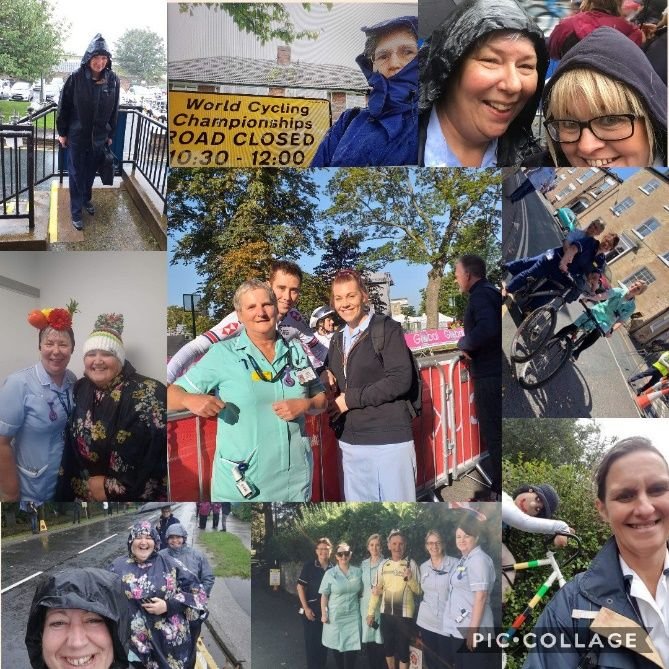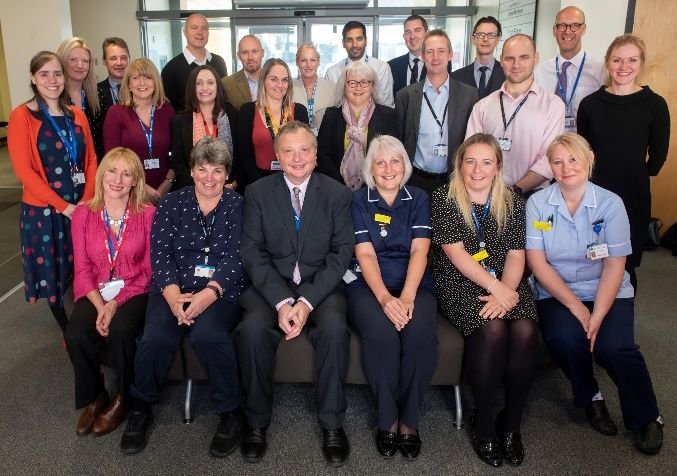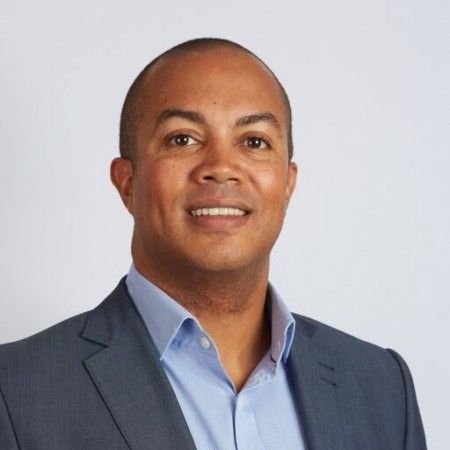Posted on: 4 October 2019
This week’s leadership message comes from Team Harrogate:
Amanda Bloor, Chief Officer for NHS Hambleton, Richmondshire and Whitby Clinical Commissioning Group (CCG); NHS Harrogate and Rural District CCG and NHS Scarborough and Ryedale CCG; Colin Martin, CEO Tees, Esk and Wear Valleys NHS Foundation Trust; Dr Peter Banks, Chief Executive Yorkshire Health Network; Richard Webb, Corporate Director, North Yorkshire County Council; Steve Russell, CEO Harrogate and District NHS Foundation Trust and Wallace Sampson, CEO Harrogate Borough Council.
#Harrogatewelcomestheworld
#Hello, our name is Team Harrogate
Over the last few days, everyone else has discovered what we already know: that Yorkshire (and, especially, Harrogate) is the centre of the World!
 1,400 riders competing from 90 countries, thousands of people lining the streets and the action beamed to a global TV audience of over 250 million: the UCI World Championships have been a fantastic showcase for the best in cycling; the most stunning landscapes, towns and villages; and the vibrancy of our communities. We have laughed; we’ve been choked up with emotion; we’ve been inspired; and we’ve been both sunburned and rain-soaked.
1,400 riders competing from 90 countries, thousands of people lining the streets and the action beamed to a global TV audience of over 250 million: the UCI World Championships have been a fantastic showcase for the best in cycling; the most stunning landscapes, towns and villages; and the vibrancy of our communities. We have laughed; we’ve been choked up with emotion; we’ve been inspired; and we’ve been both sunburned and rain-soaked.
 Never before has a UCI Road World Championships encompassed 10 different start locations – right across Yorkshire - and seen male and female riders compete alongside each other (like they did in the first-ever Team Time Trial Mixed Relay), as well as a ground-breaking para-cycling event (the Yorkshire 2019 Para-Cycling International) alongside it.
Never before has a UCI Road World Championships encompassed 10 different start locations – right across Yorkshire - and seen male and female riders compete alongside each other (like they did in the first-ever Team Time Trial Mixed Relay), as well as a ground-breaking para-cycling event (the Yorkshire 2019 Para-Cycling International) alongside it.
Behind the scenes, an extensive network of people and agencies made sure that not only were the events a success but those essential public services kept running around the clock. And the volunteers, always an important part of the glue that makes our communities work, were even more to the fore. A big thank you from us to everyone who made this happen.
 One of the enduring legacies from UCI has to be that this is not just about elite sport. £15 million Government funding already allocated to develop entry-level cycling facilities across England which will ensure it leaves a long, lasting legacy as well.
One of the enduring legacies from UCI has to be that this is not just about elite sport. £15 million Government funding already allocated to develop entry-level cycling facilities across England which will ensure it leaves a long, lasting legacy as well.
View here to listen to one of our team talking about what the last few days have been like and why it matters to health and social care.
Nine days of breath-taking cycling and community celebration and we all woke up to a Monday morning like any other - traffic back to normal; people getting in touch with health and social care services, like they always do.
But not quite like any other Monday because from 30 September, we have brought together primary care, community health and adult social care within the new Harrogate and Rural Alliance. Find out more here.
 300 colleagues working directly within the new service, organised around our primary care practices and bringing together five health and social care partners to begin with, with potential to grow rapidly.
300 colleagues working directly within the new service, organised around our primary care practices and bringing together five health and social care partners to begin with, with potential to grow rapidly.
Learning from our new models of care experience, the Alliance intends to not only #sharethebiscuits but to develop an ambitious approach to preventing ill health, support and care in an alliance with public, private and voluntary sector partners and, crucially, between our frontline colleagues and the public.
 Working as a team, we have already learned a lot over the past 12 months to get us to this point. We want to build on the best of what exists today and to create something different and special for the future, driven by what we are calling “a passion for well-being at the heart of our communities”. And, yes, spurred on by UCI, the e-bikes are on order..!
Working as a team, we have already learned a lot over the past 12 months to get us to this point. We want to build on the best of what exists today and to create something different and special for the future, driven by what we are calling “a passion for well-being at the heart of our communities”. And, yes, spurred on by UCI, the e-bikes are on order..!
Best wishes and have a good weekend,
Amanda, Colin, Peter, Richard, Steve and Wallace
Team Harrogate
 Building more diversity into leadership
Building more diversity into leadership
Building on discussions at the Partnership Board meeting on 3 September 2019, the focus of the leadership session on Tuesday was on how we build more diversity into our leadership. This included:
- Celebrating the diversity that we have and the contribution that it makes; and
- Discussing and agreeing a set of commitments as a Partnership in relation to diversity of our leadership.
The session was led by Owen Williams, CEO for Calderdale and Huddersfield NHS Foundation Trust. Owen is also the CEO Lead for our Capital and Estates Priority Programme. He was recently named amongst the country's top 100 in a list of BAME Business Leaders in September. And other colleagues including Richard Stubbs, CEO for the Academic Health Science Network and Fatima Khan-Shah, our Programme Lead for Unpaid Carers.
Over 80 leaders in the room watched a series of thought provoking films from colleagues working across the Partnership. Watch these films produced by colleagues (click on link). They include a series of challenging questions:
Cherill Watterston
Q - What’s the subtle advice you would give to the Chief Executive or Leader of Council who privately thinks s/he is already a good leader on BAME diversity but that’s not how it feels for the colleagues that work [in] their organisation?
 Fatima Khan-Shah
Fatima Khan-Shah
Q - What would you whisper to the CCG accountable officer who could not instantly describe the positive outcomes they have achieved for their BAME population?
Richard Stubbs
Q - What, in your opinion, would be a “phenomenal” commitment that the attendees on the day could make?
Rob Webster
Q - Why might it irritate BAME colleagues when they hear leaders say that race should be treated just the same as other protected characteristics?
Owen Williams
Q - How would you respond to a white member of staff who thinks it is unfair and discriminatory to organise special regional events that focus on BAME people and staff?
Errol Brown
Q - What is the advice that you would give the white leader who would be nervous of attending a BAME staff forum for fear of saying something daft?
Ian Holmes
Q - In pulling this together, did you give any thought to the fact that you were the visible minority amongst colleagues – either way what does that feel like?
Dipika Kaushal
Q - In 2017 the Guardian reported that “just 36 of 1,000 most powerful people are from ethnic minorities, despite decades of anti-discrimination laws”. Do you really believe that the majority of white leaders want to see this change for the better?
Pam Bhupal
Q - Imagine you are in 2022 and looking back on this event today - what would success feel like from a WY&H partnership perspective?
Salma Yasmeen
Q - What’s the “nudge” you would give the senior leaders in the room about progressing BAME senior management career progression?
Everyone in the room was determined to do something positive to address this inbalance.
The session was a huge success – with colleagues speaking powerfully and proudly about what they think should happen to make positive change and others feeling humbled and inspired.
It gave everyone cause for reflection both in their personal and professional life with some inspiration on how they may do things differently.
The session was timely given that October in the UK Celebrates Black History Month. It was a great way to ‘kick-start’ the month. The main aims of Black History Month are to celebrate the achievements and contributions of black people not just in the UK, but throughout the world and to educate all on black history.
 Huge thanks to Owen, Richard, and all other colleagues in the room for challenging us all to think differently and most importantly to do positive things with it.
Huge thanks to Owen, Richard, and all other colleagues in the room for challenging us all to think differently and most importantly to do positive things with it.
If you are a twitter user you can follow @wyhpartnership and search on #wyhtalent to find out more from the day.
Read Richard Stubbs, Chief Executive Officer, Yorkshire and Humber AHSN blog on ‘Innovation² – the multiplier effect of diversity: the business case’.
What else has been happening this week?
West Yorkshire and Harrogate Health and Care Partnership Draft Five Year Plan
The first draft of our Five Year Plan was submitted to NHS England / NHS Improvement on Friday 27 September 2019. A big thank you to everyone who has been involved in our journey so far – we will be sharing the feedback we receive. In the meantime, our focus remains on developing and engaging with our stakeholders and partners on this important plan for West Yorkshire and Harrogate people.
Funding news
Capital announcement
Over the weekend, the government announced (as part of the Government’s new Health
Infrastructure Plan), a rolling five-year programme of investment in health infrastructure including capital to build new hospitals, modernising primary care estate and investing in new diagnostics and technology.
 Two new hospitals at Leeds General Infirmary (LGI)
Two new hospitals at Leeds General Infirmary (LGI)
Leeds Teaching Hospitals NHS Trust received news from the Government last weekend that it has given the ‘full go-ahead’ for plans to build two new hospitals at Leeds General Infirmary (LGI).
The announcement was a wonderful surprise that will enable the Trust to forge ahead with their plans for the development, called Hospitals of the Future.This announcement is part of the Government’s new Health Infrastructure Plan, a rolling five-year programme of investment in health infrastructure including capital to build new hospitals, modernise primary care estate and invest in new diagnostics and technology.  The trust is one of six that will be given a share of £2.7bn brand new money from the Treasury in this first wave of funding.
The trust is one of six that will be given a share of £2.7bn brand new money from the Treasury in this first wave of funding.
Transformation funding
Our Partnership has been allocated £8.75m transformation funding by NHS England / NHS Improvement to boost the work of its priority areas, including urgent care, mental health and work with community partners. Funding priorities were agreed by the Partnership Board at their September meeting in public. The Board is an important group for the Partnership, it brings elected members, non-executives and public lay members into the decision making process
The funding will go towards:
- The development of urgent and emergency care work (£3.8m), including boosting the work around community pharmacists taking direct referrals from NHS 111 so more people with minor health needs can receive a face to face consultation. It will also be used to increase the multi-disciplinary workforce of the GP Out of Hours service to improve patient access to unplanned care.
- Implementing new service models in mental health, learning disabilities and autism (£1.4m). This will include recruiting new roles to support the rehabilitation of more people with complex needs and those with a learning disability. It will also be used to develop new ways of working around psychiatric intensive care, secure services and addressing barriers to crisis support for people with autism. £1.4m of funding will be used to prevent ill health and tackle health inequalities that exist across WY&H. These differences have a huge impact, because they can result in people who are worst off experiencing poorer health and shorter lives.
- An investment in the Harnessing the Power of Communities programme (£0.9m), working with voluntary and community organisations to improve person-centred wellbeing at a local level.
- Investment in the new children, young people and families programme (£0.4m) to develop, share and spread good practice across WY&H.
- £0.8m was approved to support the funding of specific projects such as the creation of a single pathology network for West Yorkshire and Harrogate.
West Yorkshire and Harrogate Clinical Forum
The Clinical Forum met on Tuesday. The meeting is chaired by Dr Andy Withers. It includes medical directors, GPs, pharmacists, allied health professionals and lead nurses. Members commented on the development of the West Yorkshire and Harrogate Digital Strategy and the draft Yorkshire and Humber Digital Health and Wellbeing Charter.
There was also a conversation about our workforce readiness tool ahead of the System Leadership Group meeting. The tool links to the development of the NHS People Plan and the refresh of the Partnership’s workforce strategy ‘A healthy place to live, a great place to work’. Members talked about staff resilience, and how vital it is to support and retain our workforce to fill the gap of those retiring over the coming years.
Dr James Thomas (Clinical Lead for Improving Planned Care and Standardisation of Commissioning Polices) and Catherine Thompson (the Programme Director) discussed the eye care workstream to standardise clinical pathways for a range of conditions and harmonise the clinical thresholds for policies within these pathways
Tony Jamieson, from the Academic Health Science Network was keen to seek members’ views on the innovation and improvement plans for 2019/20 and 2020/21. Tony explained that West Yorkshire and Harrogate has embraced the potential to innovate, spread and share good practice and that the Partnership approach is very positive. This is down to the strength of clinical leadership and early adopters of the work, such as the Healthy Hearts project. The work of mental health, supporting people with respiratory problems (for example asthma) and COPD were highlighted.
The link to the wider determinants of health, including housing and communities is vital. It was agreed that more council colleagues would be invited onto the Innovation and Improvement Board so the work reflects the direction of travel.
West Yorkshire Association of Acute Trusts (WYAAT hospitals working together)
The WYAAT Chief Executives met at their monthly programme executive meeting on Tuesday. The group considered five key items:
- West Yorkshire and Harrogate Pathology Network: The Chief Executives reviewed the Pathology Network Strategy which will be considered by the WYAAT Committee in Common at the end of October.
- Innovation and improvement: The Yorkshire and Humber AHSN briefed the group on the innovation priorities for 2019/20, including support for outpatients’ transformation in all the trusts. Each trust is working hard to improve outpatient services and this will be enhanced through the AHSN’s work which will share best practice from within West Yorkshire and Harrogate and further afield, as well as identifying the most promising digital innovations.
- Leeds briefing: Following the announcement that Leeds Teaching Hospitals has been awarded a share of £2.7bn capital funding to build a dedicated children’s hospital, providing specialised children’s services for the region, and a new adults hospital, Julian Hartley (Chief Executive of LTHT) shared a presentation on the new hospitals. The scheme will also include the development of an innovation district in the centre of Leeds which attract new investment and create high quality jobs for the region.
- West Yorkshire and Harrogate Digital Strategy: Cindy Fedell, Programme Lead for our Digital Programme, presented the Digital Strategy which has been developed over a number of months with input from colleagues across the area. The group welcomed the strategy which will provide a framework for the digital development of West Yorkshire and Harrogate and help prioritise investment. The discussion emphasised the importance of ensuring staff and citizens have the skills to use the new systems and information since it is people, not systems, which will transform healthcare.
- Cancer: The West Yorkshire and Harrogate Cancer Alliance updated the Chief Executives on the progress of their work to improve prostate cancer pathways. The group strongly supported the approach of sharing each organisation’s action plan and committed to supporting their teams to deliver the plans
Joint Committee of Clinical Commissioning Groups
The Joint Committee met in public on Tuesday 1 October, chaired by Marie Burnham, independent lay chair. You can read the papers and find out more here.
The Committee is made up of the nine West Yorkshire and Harrogate (WY&H) Clinical Commissioning Groups (CCGs). It has delegated powers from the CCGs to make decisions on specific work programmes. Seven members of the public attended and asked a number of questions about agenda items. These will be published on our website.
Members agreed a West Yorkshire and Harrogate level commissioning policy for shoulder pain and agreed to adopt the recommendations of NHS England low priority prescribing programme. They also agreed cholesterol treatment guidance for the area and received an update on the implementation of the West Yorkshire and Harrogate Bariatric Surgery Commissioning Policy.
Commissioning policy for shoulders
Dr James Thomas, GP Chair for NHS Airedale, Wharfedale and Craven CCG and Clinical Lead for Improving Planned Care and Standardisation of Commissioning Policies presented a shoulder commissioning policy. Shoulder pain is a common condition for many people with a number of different causes, such as trauma, and ‘wear and tear’. This policy does not cover acute shoulder pain from a recent injury, but does include shoulder pain following long standing injury. Shoulder pain can arise from the muscles and tendons around the shoulder (rotator cuff pain); from the joint itself (glenohumeral joint) having arthritis or being stiff, generally called a ‘frozen shoulder’.
All people referred for shoulder pain should have an assessment of their BMI and smoking status, as well as other ‘lifestyle factors’ that may influence their long term health outcomes, as part of the ‘making every contact count’ approach.
Shared decision making between the clinician and the person is important when considering shoulder surgery to understand the risks and benefits and the post-procedure recovery and timeframe. Equality of access was discussed as well as good quality pain management and access to physiotherapists and pain clinics.
The Committee agreed to implement the policy within three years as part of the musculoskeletal (MSK) programme. This will give CCGs time to ensure that there is adequate physiotherapy support in place.
NHS England low priority prescribing programme
Dr Thomas also presented the recommendations of the low priority prescribing programme which is part of the NHS England and NHS Improvement Medicines Value Programme. The programme aims to increase value from the prescribing budget and reduce unwarranted variation in prescribing practice. A series of new recommendations was published on 29 June 2019 for implementation across England. The items mainly relate to dermatology and cardiac conditions.
Bariatric surgery implementation update
Michelle Thomas, Director of Quality and Nursing, Bradford District and Craven CCGs gave an update on the implementation of the West Yorkshire and Harrogate commissioning policy for bariatric surgery. Each CCG will strive to increase the number of bariatric procedures offered to a level that is at least 4% of the eligible population. This would mean that in 2019/20 around 355 local people could potentially have bariatric surgery - if they are suitable and prepared for surgery, and the capacity is available. This is compared to 158 people across the area that had bariatric surgery in 2018/19.
Our ambition to offer more bariatric surgery is supported by strong clinical evidence that it is cost-effective because of the links between obesity and life-limiting illnesses such as type 2 diabetes and cancer. Conversations will continue with care providers to ensure that sufficient surgical support is available across our area.
 Healthy Hearts
Healthy Hearts
Dr Steve Ollerton, Chair, Greater Huddersfield CCG presented WY&H standardised and simplified treatment guidance for people with high cholesterol. This is part of the Healthy Hearts project which aims to help reduce the risk of heart attack and stroke for people at highest risk.
The guidance supports the second phase of the Healthy Hearts project. It aims to reduce the chance of people developing conditions affecting their heart or blood vessels, improve the outcomes of people already living with these conditions, and improve health outcomes for those living with diabetes. A further update will be given at the end of the year. The Joint Committee welcomed the success of the project so far and agreed the cholesterol treatment guidance.
System Leadership Executive Group
The Executive Group met on Tuesday. This includes leaders from all partner sectors, including councils, hospitals, clinical commissioning groups, Healthwatch and community organisations. It is chaired by Rob Webster, our Partnership CEO Lead. Leaders welcomed Mel Pickup ahead of her new role as CEO at Bradford Teaching Hospitals NHS Foundation Trust in November.
Julian Hartley, CEO for Leeds Teaching Hospital NHS Trust attended the meeting. He explained how delighted colleagues are about the news that the Trust will be receiving funding for the two new hospitals (please see above). The two new hospitals will also offer regional services. Rob explained that our two top priorities for the Partnership capital funding have now been approved. The other is Calderdale and Huddersfield NHS Foundation Trust, who received funding confirmation in December 2018 for £196.5m.
There was also a conversation about our region’s world-class health economy which gives us a huge advantage in terms of economic benefits for the area. We have world leading services for cancer and heart surgery and other examples known outside the UK include ‘Born in Bradford’ and the work of the Leeds Academic Health Partnership.
Pip Goff from Leeds Forum Central, highlighted how good the Institute for Voluntary Action Research event held with West Yorkshire and Harrogate third sector colleagues recently was in terms of engaging with community representatives. We have a vibrant community sector and their partner role is vital in delivering our five year ambitions, including those linked to connecting people via digital technology.
Rob updated leaders on the NHS’s recommendations to Government and Parliament for an NHS Integrated Care Bill to the NHS England / NHS Improvement Board Meeting in Common on 26 September. The Board papers included a set of recommendations following an engagement exercise around the potential for legislative changes to the Health and Social Care Act 2012. Rob was part of a small working group who considered the current Act and subsequent recommendations. The initial proposals have also gone through an extended engagement process, including the cross-party Health and Social Care Select Committee.
The main recommendations include removing barriers that make it hard for NHS organisations to collaborate with each other and their many local partners. This collaboration is essential if our ambitions to improve people’s health and wellbeing as set out in the NHS Long Term Plan are to be delivered. It also recommends removing section 75 of the 2012 Act which sets out unnecessary procurement processes, which can hinder system progress and often encourage provider competition. Any changes to the Act cannot be seen in isolation of mutual collaboration and our commitment to deliver better care and support for West Yorkshire and Harrogate people. This is a strength of our Partnership which has been built on mutual trust and clearly demonstrated in our ability to work well together across shared agendas towards collective ambitions for staff and those we serve. You can read the NHS England / NHS Improvement papers here.
Our Partnership digital strategy was also discussed. This sits alongside a draft Digital Health and Wellbeing Charter which sets out digital ambitions for the region. The Charter is also currently being considered by South Yorkshire and Bassetlaw Integrated Care System; and Humber, Coast and Vale Sustainability Transformation Partnership.
Our digital priorities include supporting digital literacy for our current and future workforce; enabling people to access care and support to improve their health and wellbeing and also exploring how we connect people who aren’t connected. Cyber security is really important in regards to people’s data as understands the needs of people who don’t access technology.
Brendan Brown, CEO for Airedale NHS Foundation Trust and CEO Lead for the Partnership’s workforce updated leaders on a recent report carried out over the summer following the publication of the Interim NHS People Plan. The report highlighted that the Partnership has the architecture in place to manage workforce development on a system wide footprint; it also emphasised that the right leadership and governance is in place. More resource is needed if the Partnership is to take on greater responsibilities in this important area. It is also important that we look at the workforce development support in our six local places (Bradford District and Craven; Calderdale, Harrogate, Kirklees, Leeds and Wakefield). Leaders are keen to work together on developing our health and care workforce strategy for those working across sectors now and in the future.
Innovation and improvement was also on the agenda. The conversation was led by Richard Stubbs, CEO for the Yorkshire and Humber Academic Health and Science Network. As a health and care system we have a track record for innovation and as a region we have a wealth of assets, including a thriving university sector, over 250 HealthTech businesses, and a strong Academic Health Science Network. Our intention is to position the region as an area of expertise, growth and productivity that will deliver high quality outcomes and clear benefits for people. Work in West Yorkshire and Harrogate has already had significant impact. For example, the Atrial Fibrillation project has prevented 123 strokes over 18 months. This is as many as 400 strokes avoided over five years. Connect with Pharmacy (Transfer of Care Around Medicines) has helped over 4000 people to use their medicines well and avoid being re-admitted to hospital and PreCePT has protected 40 pre-term infants from developing cerebral palsy.
What’s happening next week?
- Local place planners meet on Tuesday (Bradford District and Craven; Calderdale, Harrogate, Kirklees, Leeds and Wakefield).
- Programme leads for our priority areas meet on Thursday.
- The first clinical directors’ event for primary care networks takes place on Friday.

